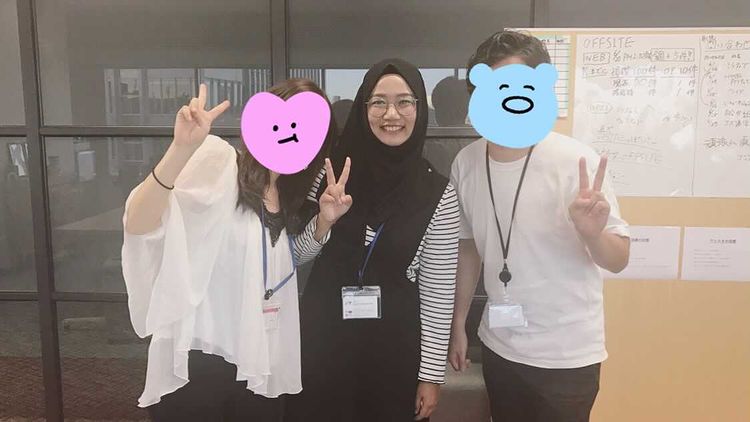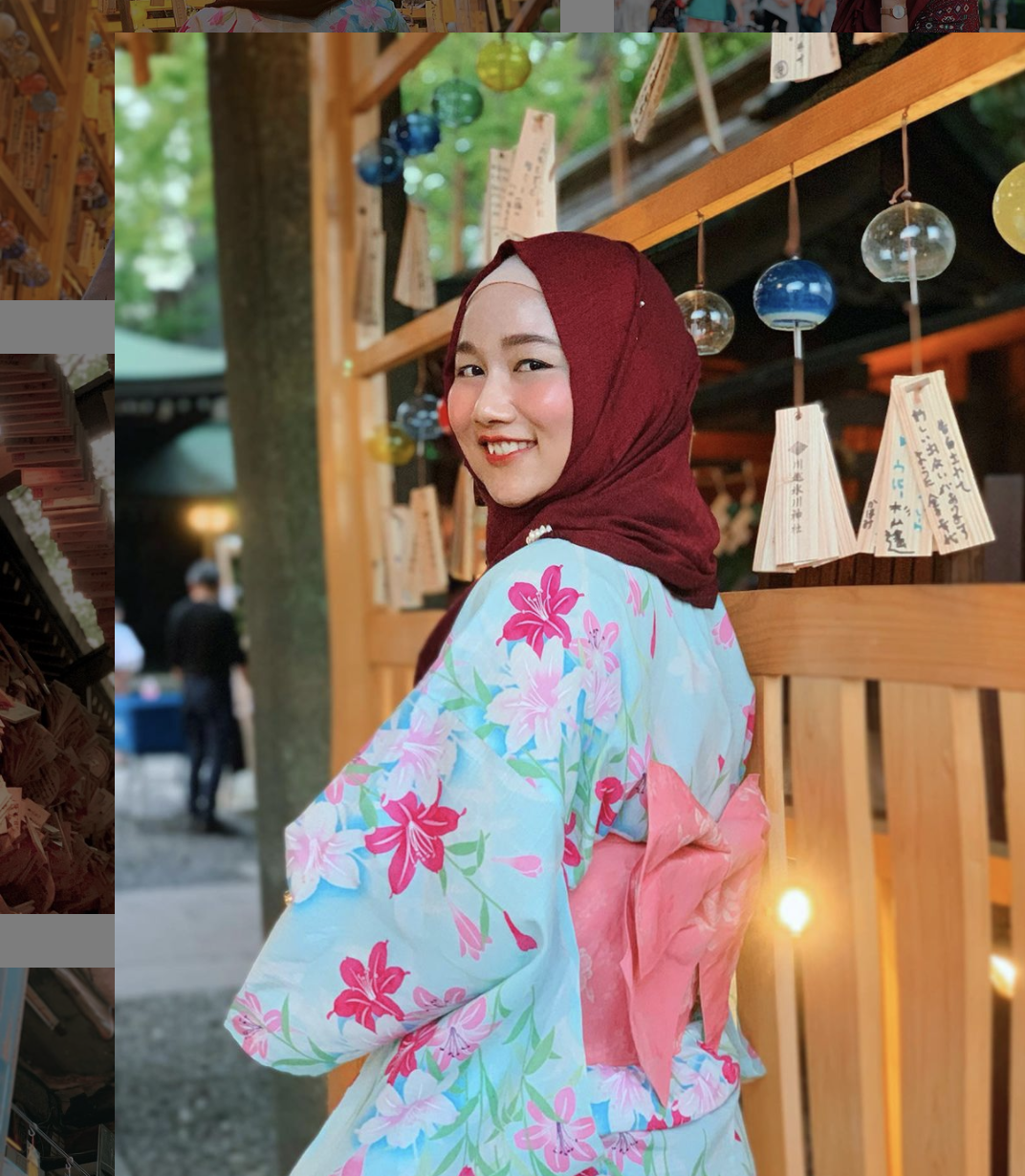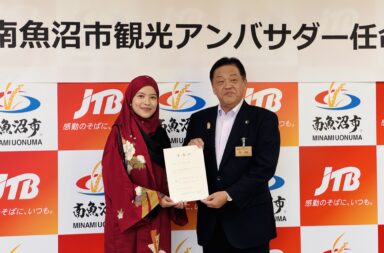Written by: Wasistha Weesenha Putri
Just Like You, I am a Girl Who Attracted to Japan Through Anime
Who doesn’t know about Doraemon, Crayon Shinchan, or Sailormoon? As an Indonesian who grew up in the ’90s, these anime have been my favorite since I was in elementary school. Every Sunday, I would wake up early in the morning and immediately sit in front of the TV to watch them sequentially, starting from 6 am to 11 am, nonstop.
I had also been reading the manga too. Dragon Ball, Detective Conan, Kungfu Boy, you name it. I owned more than 500 mangas of popular titles, neatly arranged by the series number inside my bookshelf. My interest in Japan ーin general as a countryーwas gradually rising since then.
A Long For Japan

“How does the cherry blossoms smell?”
“How does it feel to sleep on a futon?”
“I wonder how I would look in yukata?”
“The vending machine is so cool! I want to try to buy a drink from it!”
The curiosity inside the younger me about the country of samurai was intensive. There were also times when I couldn’t help but got annoyed because I didn’t understand what Detective Conan meant in his explanation about certain cases which related to Japanese kanji. That’s when I knew, “I have to learn Japanese and go to Japan!”
See Also
Learning Business Japanese: My Golden Ticket from Japan to the World
How I Finally Moved to Japan
In 2009, I took Japanese Literature major in a private university in Bandung, Indonesia, and learned Japanese from zero there. Soon after I graduated in 2013, I became a Japanese-Indonesian interpreter in several Japanese companies in the Jakarta vicinity areas.
Working as an interpreter of a foreign language which you learned only from textbooks, I must say, was really hard. I initially had a goal of going to Japan as an exchange student in my university days but unfortunately, I never got the chance. I was not the best student, and I didn’t work hard enough. I only held a JLPT (Japanese Language Proficiency Test) N3 when I graduated, so I had to study extra hard while working in my first year as an interpreter. I didn’t even know what the Japanese word for ‘paid leave’ or what ‘shouchishimashita’ (one of the variations to say ‘I understand’ in a formal way) meant at that time. It was that bad. I was only lucky when I got my first job because I got recommended by my kind senpai (senior).
See Also
Malaysian Muslimah Working in Japan ; “Effort Won’t Betray You”
Long story short, I passed the JLPT N2 in 2014, one year after I went through all the struggles in the learning-while-working phase. Once I gained more confidence in my Japanese ability, I moved from one company to another. I sometimes took freelance jobs in my spare time and even challenged myself once to a totally new position to learn more: a land operator in Jakarta in supporting Japan’s inbound tourism industry. I haven’t stopped learning since then.
In March 2017, I was given a freelance job to be the interpreter for three BODs of a Japanese company that wanted to do some research about the Indonesian market. It appeared they wanted to run a new business in the inbound tourism industry with collaboration from Indonesian local travel agencies. So the plan was to accompany them to do sales calls to some local agencies and do the interpretation in their meetings for three consecutive days.

When I was working as an interpreter in Jakarta
As someone with experience in the industry, I couldn’t help but share some insights about the Indonesian market with my clients and told them my thoughts regarding the way they approached and talked to the local agencies, which I thought could be better with some adjustment because it was their first time visiting Indonesia and it seemed they had very limited information about Indonesia’s culture. I honestly gave them advice and suggestions out of courtesy. No intention or expectation of anything at all.
But when Allah says kun fayakun, then everything is possible.

My clients suddenly scouted me to work in their head office in Tokyo as a start-up member of the new business, at the end of day two. Thinking that they didn’t really mean it, I asked them “really?” several times. I was not sure because I didn’t think I did anything that could impress them so much in particular. At the end of the last day, before they went to the airport to go back to Japan, they said “please think about it carefully and discuss it with your parents first. You can send us a reply by Messenger when you’re sure.”
Before I replied to them, I google their company thoroughly. It wouldn’t be funny if it turns out I fell into some scam from a not credible company, no? So after I made sure of everything and my parents said okay, I gave them my yes.
I flew to Japan in May 2017 by myself. The company handled all the necessary stuff and documents for me. They also provided me with a temporary apato (apartment) for the first three months for free, so I could look for my own apato to be lived in permanently. Alhamdulillah, I moved to Japan smoothly, and am still living my dream until now.

Randomly posing with my Japanese workmates
See Also
Caregiver, an Opportunity I Chose for Japan
A Short Story About My Career in Japan
Firstly, I worked in Japan’s inbound tourism industry as a land operator in Tokyo, and sometimes I also do a tour guide if needed. It was all fun and I had wonderful workmates and team, but unfortunately due to some conditions, I only lasted a year there. I resigned in June 2018.
Being a little bit idealistic, I still wanted to look for a job in which I can make use of my bilingual ability. In other words, I needed to find a job that was somehow related to Indonesian or targetting the Indonesian market.
In August 2018, I finally got a new job at a digital advertising agency through a career agent. It was one of the top-tier companies in the industry in Japan. At the time, they were looking for an Indonesian native to be a creative director to direct the process of banner-making for the Indonesian market. I got in with zero experience in the advertising industry so it became another challenge for me to learn about a totally new thing again.
See Also
What YOU Should Know About Working in Japan! (Featuring Recruitment Agency, Career Diversity. Inc)
A lot of my friends were surprised and wondered how I could get into the creative position with no experience. This is what I did, and hopefully, this could be some tips for whoever wants to work in Japan too:
・Be confident and show a Japanese standard attitude in the interview (learn how to do a proper Ojigi/Japanese bow may help!)
・Convince them that we are ready to learn from zero, actively
・Tell them about our plans or our strategy once we do the job if they hire us
My Working Life as A Muslim in Japan

I must admit that it’s not very easy to live a life as a Muslim in Japan, especially when it comes to working life. Japanese has a culture of nomikai, which literally means “drinking party”. In my workplace, they also hold a drinking party, at least once a month for each division. In the beginning, I forced myself to join the party even though I don’t drink. I just joined them for the sake of socializing because the Japanese don’t really chit-chat at work, which means, it would be hard for me to make friends if I don’t go to the party.
Every time they asked, “why are you only drinking oolong tea? Grab some beer!”, I always went with “I don’t drink. It’s prohibited in Islam.” At some moment, eventually, all of my workmates understand that I don’t drink, and once they understand, I chose not to go to the party anymore because I had enough time to make friends with them, and now they are my friends. I think this is a really tricky part: whether to choose to always go with them or not.
As for prayers, I always make sure to tell them at the interview before they hire me. I asked for 5 to 10 minutes outside lunchtime and a meeting room to be borrowed. Alhamdulillah, my previous and current work are very cooperative, and kindly let me do my prayers.
See Also
5 Things Muslims Need to Know When Working in Japan
Muslim-friendly, foreigner-friendly recruitment agency in Japan (official Instagram)
I heard some of my friends face some difficulties doing their prayers because their workplaces don’t let them. So it may differ depending on the company, but in my opinion, Japan is definitely getting more open to other cultures and many of them respect our beliefs.
The same goes when it comes to Ramadhan. I always tell my workmates a week before that I’m going to do a one-month full of fasting. Usually, it shocks them at first, but when I explain it further, they can understand and so they won’t invite me to lunch or dinner or even offer me some snacks during work time.
In my opinion, the key is to communicate. Once they understand, they will let us practice our religion. We also need to convince them that the prayers or the fasting will not interfere with any work.
No one has ever asked me to take off my hijab too. Instead, they say that it looks cute. 🙂
See Also
How to Get Halal Food in Japan
Identify Halal Products in Japan
Clearing Misconceptions in Food Ingredients


